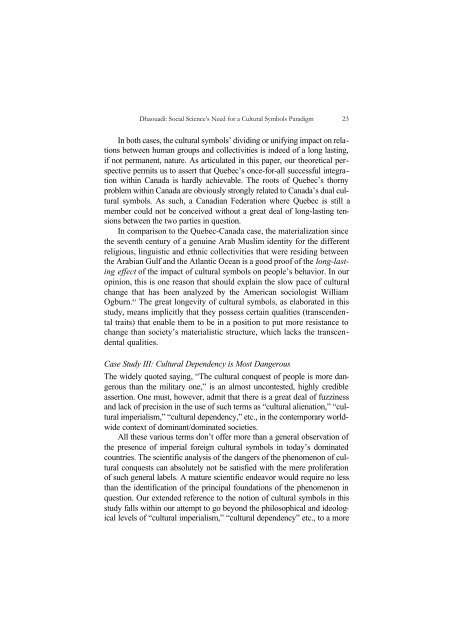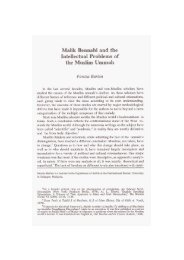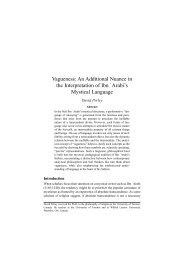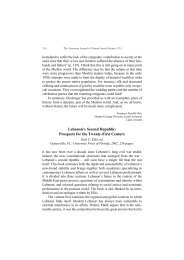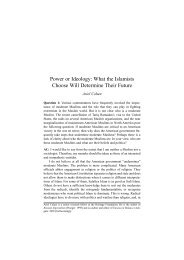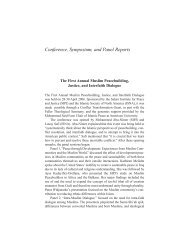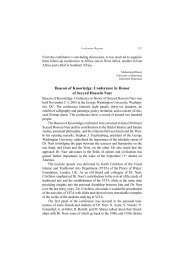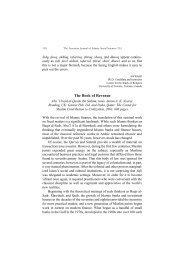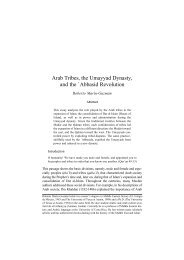Social Science's Need for a Cultural Symbols ... - Epistemology
Social Science's Need for a Cultural Symbols ... - Epistemology
Social Science's Need for a Cultural Symbols ... - Epistemology
Create successful ePaper yourself
Turn your PDF publications into a flip-book with our unique Google optimized e-Paper software.
Dhaouadi: <strong>Social</strong> Science’s <strong>Need</strong> <strong>for</strong> a <strong>Cultural</strong> <strong>Symbols</strong> Paradigm 23<br />
In both cases, the cultural symbols’ dividing or unifying impact on relations<br />
between human groups and collectivities is indeed of a long lasting,<br />
if not permanent, nature. As articulated in this paper, our theoretical perspective<br />
permits us to assert that Quebec’s once-<strong>for</strong>-all successful integration<br />
within Canada is hardly achievable. The roots of Quebec’s thorny<br />
problem within Canada are obviously strongly related to Canada’s dual cultural<br />
symbols. As such, a Canadian Federation where Quebec is still a<br />
member could not be conceived without a great deal of long-lasting tensions<br />
between the two parties in question.<br />
In comparison to the Quebec-Canada case, the materialization since<br />
the seventh century of a genuine Arab Muslim identity <strong>for</strong> the different<br />
religious, linguistic and ethnic collectivities that were residing between<br />
the Arabian Gulf and the Atlantic Ocean is a good proof of the long-lasting<br />
effect of the impact of cultural symbols on people’s behavior. In our<br />
opinion, this is one reason that should explain the slow pace of cultural<br />
change that has been analyzed by the American sociologist William<br />
Ogburn. 43 The great longevity of cultural symbols, as elaborated in this<br />
study, means implicitly that they possess certain qualities (transcendental<br />
traits) that enable them to be in a position to put more resistance to<br />
change than society’s materialistic structure, which lacks the transcendental<br />
qualities.<br />
Case Study III: <strong>Cultural</strong> Dependency is Most Dangerous<br />
The widely quoted saying, “The cultural conquest of people is more dangerous<br />
than the military one,” is an almost uncontested, highly credible<br />
assertion. One must, however, admit that there is a great deal of fuzziness<br />
and lack of precision in the use of such terms as “cultural alienation,” “cultural<br />
imperialism,” “cultural dependency,” etc., in the contemporary worldwide<br />
context of dominant/dominated societies.<br />
All these various terms don’t offer more than a general observation of<br />
the presence of imperial <strong>for</strong>eign cultural symbols in today’s dominated<br />
countries. The scientific analysis of the dangers of the phenomenon of cultural<br />
conquests can absolutely not be satisfied with the mere proliferation<br />
of such general labels. A mature scientific endeavor would require no less<br />
than the identification of the principal foundations of the phenomenon in<br />
question. Our extended reference to the notion of cultural symbols in this<br />
study falls within our attempt to go beyond the philosophical and ideological<br />
levels of “cultural imperialism,” “cultural dependency” etc., to a more


